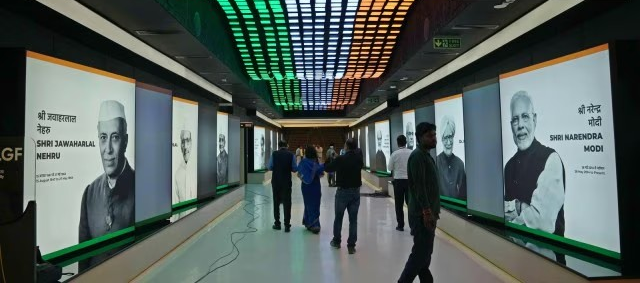



Private papers of public figures are donated historical documents, often under embargo conditions set by donors. In India, PMML now limits embargoes to five years (ten in rare cases). Official records are declassified after 25 years under Public Records Rules 1997. Donors may impose conditions, but institutions aim for broader public access.

Copyright infringement not intended
Picture Courtesy: INDIAN EXPRESS
The recent decision by the Prime Ministers’ Museum and Library (PMML) Society to legally challenge Sonia Gandhi's claim over a part of Jawaharlal Nehru's papers has brought the issue of private papers of public figures into the spotlight.
These are collections of documents that belonged to eminent public personalities. They are crucial for understanding modern Indian history and the lives of its key figures.
Types of Papers
Private Collections => These include correspondence, diaries, and personal documents of prominent individuals. They are normally owned by the person's family or other private individuals, not the government. The PMML holds the largest collection of such papers in India.
Personal Papers => This is a subset of private collections but refers to documents of a purely personal nature. Correspondence and documents held in a personal capacity are generally excluded from broader private collections accessible to researchers.
Official Records => These are different from private papers. They are documents held by government departments and ministries, such as official letters, file notings, and records related to the functioning of the government.
The Jawaharlal Nehru Papers were the first set of private papers acquired by the Nehru Memorial Museum and Library (NMML), now PMML. They were transferred in several batches starting in 1971 by the Jawaharlal Nehru Memorial Fund (JNMF) on behalf of Nehru's legal heir, Indira Gandhi. Later, Sonia Gandhi also handed over a collection of his post-1946 papers.
Claim: In 2008, when she was the chairperson of the NMML Society, Sonia Gandhi reclaimed over 50 cartons of these donated papers and restricted access to several other sets.
Government's Stance => The PMML Society, now headed by Prime Minister Narendra Modi, contends that these papers are a "national treasure" and should be returned to the museum for preservation. The society has decided to pursue legal action to reclaim them.
Official Records => These are governed by the Public Records Act, 1993, and the Public Records Rules, 1997, which mandate that official records should ordinarily be declassified after 25 years. The responsibility for declassification lies with the respective government organization. The Act defines "Public Records" as any record of the central government, its ministries, and offices, including the PMO and the President's Office.
Private Papers => The Public Records Rules do not apply to papers owned by private individuals or families. Access to these is voluntary, usually arranged through donation or, in some cases, sale.
Donor Conditions (Embargoes) => Donors of private collections can and often do impose conditions on access and declassification. They can set embargoes for an unspecified period, during which the institution can conserve the papers but cannot make them public.
Recent Changes by PMML => To prevent indefinite restrictions, the PMML has decided that new donations will, under normal circumstances, have an embargo of only five years, extendable to a maximum of ten in rare cases. The museum has also started opening up collections that have been held for decades.
Source:
|
PRACTICE QUESTION Q. Critically analyze Jawaharlal Nehru's role as the architect of modern India, focusing on his contributions to nation-building in the initial years after independence. 250 words |




© 2026 iasgyan. All right reserved